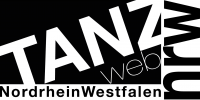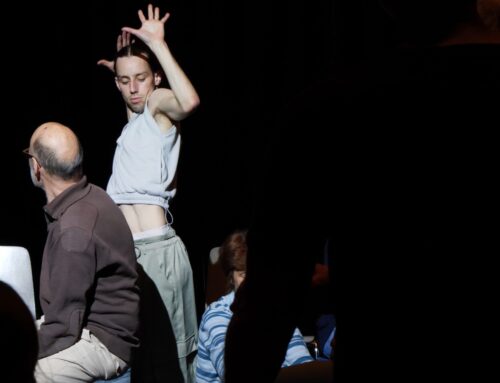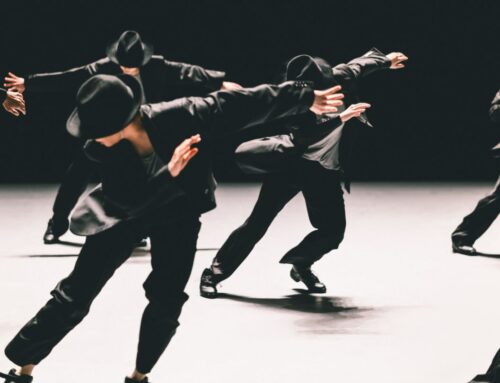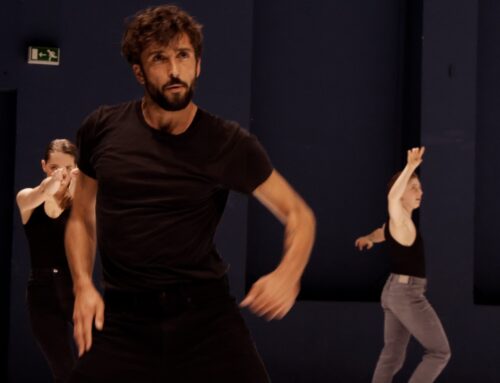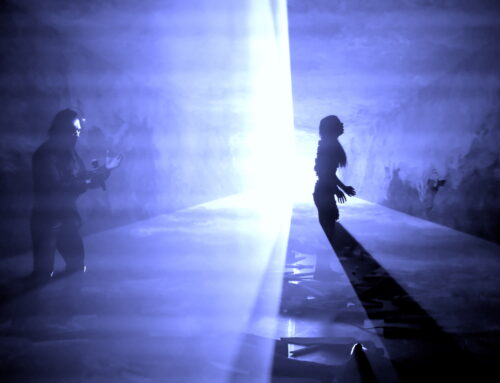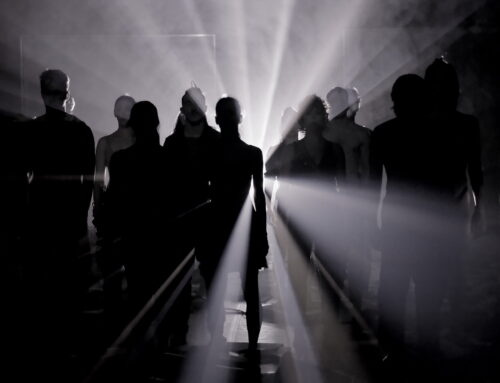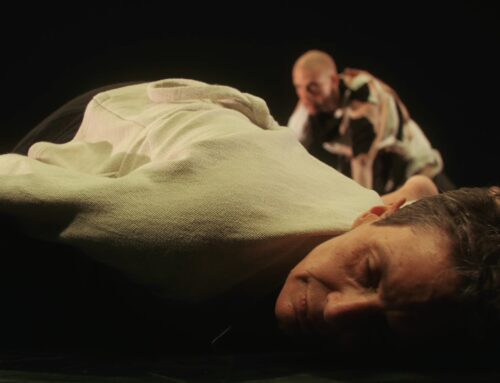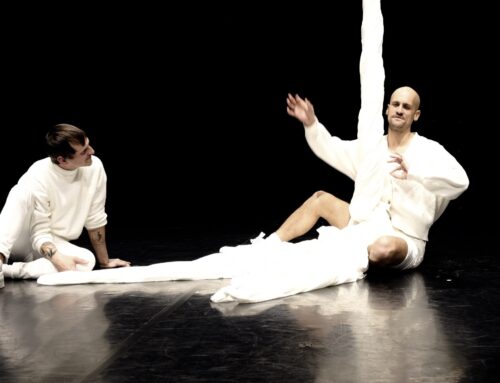Gisèle Vienne’s world premiere
Better to be alien than used
„Extra Life“ as part of the Ruhrtriennale 2023
review by Melanie Suchy
In the middle of the play, one wonders if it was conceived and rehearsed in the Corona era. Whether lockdown and spacing conditions led to only three people acting on a huge stage. And in this case, the word „acting“ also refers to insanely little action, and for two hours. Extra-long. At some point, one suspects, „Extra Life“ is supposed to be a kind of deep drilling for buried memories, as a dialogue, thought, body and feeling work. As a game. The director dares a lot, the payoff is hard to come by.
Extra large, the whole thing is set up in the salt warehouse of the coking plant at Zeche Zollverein. From the built-in grandstand, one looks into a seemingly unlimited deep dark room with a rough floor. This matches the industrial hall, but is faked with stone crumbs on rubber flooring. A single pale light illuminates the inhospitable space like a moon or a street lamp. There is a car. Cars seem to be in fashion again on stage as wrecks, as signs of the end of time. This one also looks dead and old until it opens its eyes like an animal. The spotlights gradually fill up their light until it is yellow-warm and draws parallel lines into the fogging square.
This interweaving of living being or liveliness with machine or control mechanism underpins „Extra Life“. In Gisèle Vienne’s overall concept and set, it creates magic in the best moments like these. The great lighting design contributes to this, the sound composition by Caterina Barbieri and Adrien Michel, and later the walking and dancing of the human protagonists. Vienne makes the uncanniness of this magic comprehensible on stage, the horror too. And the ridiculous is not far away and the realisation of what is just a show, a game with the senses: It’s funny how black smoke billows out of the top of the car as if it were rumbling. Inside, now softly lit behind the windscreen, two people sit, one smokes, the other crunches chips from a bag. Later, a deliberately overwhelming light show draws lines and walls out of a square frame into the hazy room and into the audience, fanning out, squeezing in, tunneling. Slowly at first, measured, then jerking, as if a creature were bucking and about to snap. All imagination.

Extra-Life22-in-der-Regie-von-Gisele-Vienne-bei-der-Ruhrtriennale-©-Katrin-Ribbe
NEGOTIATING
Indeed, the production alludes to games, computer games or film scene re-enactments, and confuses skilfully and very contemporary, but it also strains the brain: what is „real“, what is played? The two occupants of the car, Adèle Haenel and Theo Livesey, chat over-night, after a party or as a party of two. As siblings or close friends. They talk – the lyrics are by Vienne, Haenel, Lievesey – about „my character“, play figure. Sometimes they disguise their voices, or the sound design adds reverb and echo. He says, „Stop with the voices!“. But he also searches for a station between static on an old-fashioned radio. American voices sound on the air, a woman and a man talking about alien abductions, aliens. Twenty-three times this had happened to him. Now, when the two party people get out of the car, they become aliens themselves. Or people in outer space.
This outer space slows down their movements. It makes them seem to float. Especially him, who first plays the sparking astronaut, „kch, kch, it’s like a desert here, but I’ve never been in one“, quotes the Terminator, „I’ll be back“, then takes off into a blissfully oblivious dance. The body as a gently undulating swath of mist.
Later, he also uses it to infect his chip-munching companion, even the strange third figure who first roams around in the shadows, in slow motion, Katja Petrowick, approaches, disappears and at some point materialises, jacket off, as a woman with a shiny silver top and sports trousers, as a magician of light and the large pose with long arms, as an avatar who walks, stops, repeats paths and increasingly copies, doubles the car passenger. They all raise their hands and faces as if in the sound bath of a club.
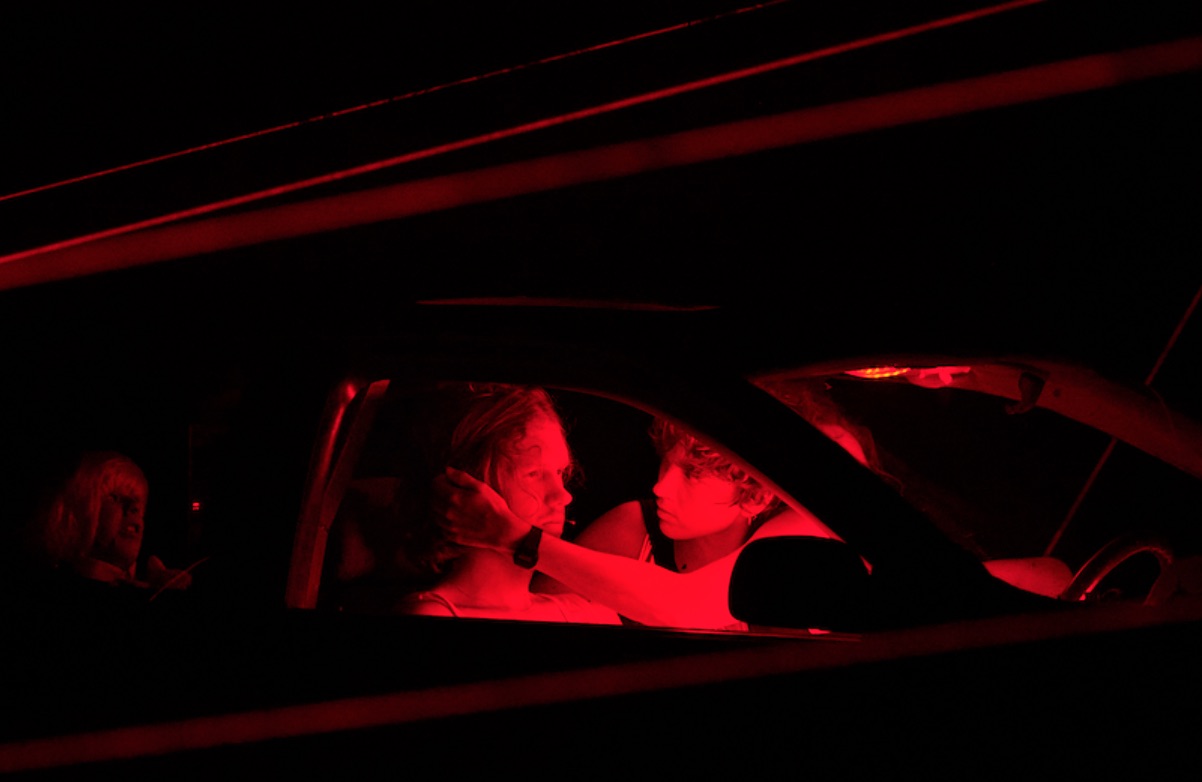
Extra-Life22-in-der-Regie-von-Gisele-Vienne-bei-der-Ruhrtriennale-©-Katrin-Ribbe
PROMISE
No wonder, because the studied philosopher and puppeteer Giselle Vienne had choreographed exactly that in 2017: „Crowd“ was quite great. With a lot of people, to techno, everything in slow, without words, yet not silent, but full of stories, wishes, encounters. In this country, it made a guest appearance at the Tanzhaus NRW in Düsseldorf in 2019.
„Extra Life“ is like zooming into one or two of the crowd particles of the time. What is someone seeking redemption from in the beats, in the great vibrating and drifting? The story hidden behind the conversations of Clara and Félix – that’s what they call each other – as a memory, which they struggle to conceal and unpack with crunching language and with the games, squatting in the cramped car, pacing delayed over space, attempts at touching, flinching back, hugging, giggling, crying, is that of repeated abuse on children or a child. On him, Félix, or both.
The red threads that spanned his imagination in the room when he felt totally paralysed, as he tells it, span the whole stage once towards the end. All the lines that the light casts or ejects through the misty clouds as red, then growing white lines, are crossed by others. As if they were not alone. There is something comforting about that. But the car headlights stubbornly shine parallels. Which only meet in infinity. Exactly in between, the unfortunates bend.
Does the story bear this staging, which reaches into the gigantic? If you as an audience member have caught the thread that it is about the immeasurable suffering of children who have become adults, stranded in the night, unable to go forward or back, then yes. But it sags at times, and the confusion of French and English, seconded by surtitles in English and German, makes you nervous, plus the length, it drags. The sophisticated synthesiser music helps, of course, it blows spacy, hisses, rustles, chirps, it organises, repeats minimalist phrases of high notes, upwards, upwards, runs as if automated or lets rhythm in, sometimes it echoes extremely low, sometimes heartbeats drum, bubumm, bubumm. Terribly wide and loud, this inner space.

EXTRA-LIFE_Gisele-Vienne©Estelle-Hanania
